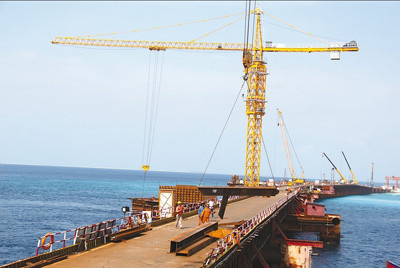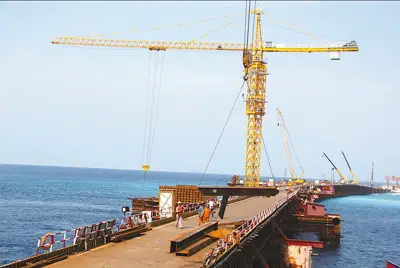By Yuan Jirong and Hu Zexi from People’s Daily

Pics: The China-Maldives Friendship Bridge is under construction. (Photo by Yuan Jirong from People’s Daily)
The Maldives, an archipelagic nation in the Indian Ocean, will soon realize its dream to have a bridge with the assistance from a Chinese company.
The China-Maldives Friendship Bridge, named by Maldivian President Abdulla Yameen, will span from eastern edge of Malé island to the western corner of the island of Hulhulé, where the international airport is located.
Lack of bridges has been a bottleneck in the development of the South Asian island country. Local residents, over the past years, had to travel among the islands by ferry.
Against such backdrop, the bridge under construction is high on the priority list of the island country and its president.
Speaking at the ground-breaking ceremony, Yameen said that the day China agreed to construct the bridge was one of the happiest days in his life. The bridge, a dream for generations of Maldivians, is also a cornerstone for the nation’s future, the president added.
It was Yameen who proposed to name the cooperation project as “China-Maldives Friendship Bridge” when Chinese President Xi Jinping paid a state visit to his country in September 2014.
Local public even hailed the bridge as a millennium project of the country. Though the country comprises a territory spanning nearly thousand islands, most of its citizens live on the islands of Malé, Hulhulé and Hulhumalé.
In the past, there was a road connecting Hulhulé and Hulhumalé islands, but ferries served as the only mode of transportation between Malé and Hulhulé islands. The roads on Malé, an island covering less than 1.8 square kilometers, are so narrow that it is hard to drive a truck.
The bridge, upon completion, will link the three islands together so that the country can embrace a jump in growth. It will also boost the economy of the atoll chain and improve the living conditions of people residing on the Malé island.
Mohamed Muizzu, Maldivian Minister of Housing and Infrastructure, told the People’s Daily that the bridge will open the door of development for the Maldives, a country different from others in topographical condition.
The construction commenced on December 30, 2015, and is expected to be completed on August 20, 2018, said Lin Shukui, head of the technical team of the project, adding that 50 percent of the work has been finished so far.
The project was contracted by Second Harbor Engineering Company affiliated to China Communications Construction Company (CCCC).
“Though a heaven for tourists, the Maldives is a hell for construction workers,” Liu Ling, a representative sent by the Ministry of Commerce to the project described the harsh challenges when building the bridge.
The strong sea wind, unstable ocean currents, torrential water flow, coral reef, as well as a high degree of radiation, humidity and salinity all posed roadblocks for the construction. The waves rising without any breeze on the sea can reach three meters, while the water is as deep as 27 to 46 meters.
The Chinese constructors finally overcame the obstacles by exploring new ways and optimizing the designs. Working in temperatures as high as 32℃, the constructors with safe accommodation were often soaked with sweat and had to drink as much as five liters of water each day.
While in the rainy seasons, they would be threatened by the dengue fever and H1N1 Influenza virus.
The environment protection was given priority in the construction. The welder, for instance, would take a bucket to collect the rubbish generated by the welding operation.
All the industrial waste and household garbage were disposed, and the sea was kept so clean that small sharks can be seen in the water.
Harboring a desire for the bridge, many locals frequented nearby areas to check the progress, Lin said, adding that the local government also set up an observation desk equipped with telescope near the technical team, so that local residents can get the latest updates in a timely manner.
Both Maldivian officials and the public spoke highly of the project, using simple Chinese like “Good” and “Thank you” to express their gratitude to China.
“My father is proud of my job,” said Amira Latheef, the human resources head of the project. “I choose to learn Chinese because China is much stronger and the Chinese language is more popular,” said Amira, who once studied Chinese in China.
“The engagement of the Maldives in the ‘Belt and Road’ initiative has brought us a great deal of new opportunities,” added Amira.
The China-Maldives Friendship Bridge, named by Maldivian President Abdulla Yameen, will span from eastern edge of Malé island to the western corner of the island of Hulhulé, where the international airport is located.
Lack of bridges has been a bottleneck in the development of the South Asian island country. Local residents, over the past years, had to travel among the islands by ferry.
Against such backdrop, the bridge under construction is high on the priority list of the island country and its president.
Speaking at the ground-breaking ceremony, Yameen said that the day China agreed to construct the bridge was one of the happiest days in his life. The bridge, a dream for generations of Maldivians, is also a cornerstone for the nation’s future, the president added.
It was Yameen who proposed to name the cooperation project as “China-Maldives Friendship Bridge” when Chinese President Xi Jinping paid a state visit to his country in September 2014.
Local public even hailed the bridge as a millennium project of the country. Though the country comprises a territory spanning nearly thousand islands, most of its citizens live on the islands of Malé, Hulhulé and Hulhumalé.
In the past, there was a road connecting Hulhulé and Hulhumalé islands, but ferries served as the only mode of transportation between Malé and Hulhulé islands. The roads on Malé, an island covering less than 1.8 square kilometers, are so narrow that it is hard to drive a truck.
The bridge, upon completion, will link the three islands together so that the country can embrace a jump in growth. It will also boost the economy of the atoll chain and improve the living conditions of people residing on the Malé island.
Mohamed Muizzu, Maldivian Minister of Housing and Infrastructure, told the People’s Daily that the bridge will open the door of development for the Maldives, a country different from others in topographical condition.
The construction commenced on December 30, 2015, and is expected to be completed on August 20, 2018, said Lin Shukui, head of the technical team of the project, adding that 50 percent of the work has been finished so far.
The project was contracted by Second Harbor Engineering Company affiliated to China Communications Construction Company (CCCC).
“Though a heaven for tourists, the Maldives is a hell for construction workers,” Liu Ling, a representative sent by the Ministry of Commerce to the project described the harsh challenges when building the bridge.
The strong sea wind, unstable ocean currents, torrential water flow, coral reef, as well as a high degree of radiation, humidity and salinity all posed roadblocks for the construction. The waves rising without any breeze on the sea can reach three meters, while the water is as deep as 27 to 46 meters.
The Chinese constructors finally overcame the obstacles by exploring new ways and optimizing the designs. Working in temperatures as high as 32℃, the constructors with safe accommodation were often soaked with sweat and had to drink as much as five liters of water each day.
While in the rainy seasons, they would be threatened by the dengue fever and H1N1 Influenza virus.
The environment protection was given priority in the construction. The welder, for instance, would take a bucket to collect the rubbish generated by the welding operation.
All the industrial waste and household garbage were disposed, and the sea was kept so clean that small sharks can be seen in the water.
Harboring a desire for the bridge, many locals frequented nearby areas to check the progress, Lin said, adding that the local government also set up an observation desk equipped with telescope near the technical team, so that local residents can get the latest updates in a timely manner.
Both Maldivian officials and the public spoke highly of the project, using simple Chinese like “Good” and “Thank you” to express their gratitude to China.
“My father is proud of my job,” said Amira Latheef, the human resources head of the project. “I choose to learn Chinese because China is much stronger and the Chinese language is more popular,” said Amira, who once studied Chinese in China.
“The engagement of the Maldives in the ‘Belt and Road’ initiative has brought us a great deal of new opportunities,” added Amira.
 Menu
Menu
 China’s assistance helps realize Maldives’ bridge dream
China’s assistance helps realize Maldives’ bridge dream
















